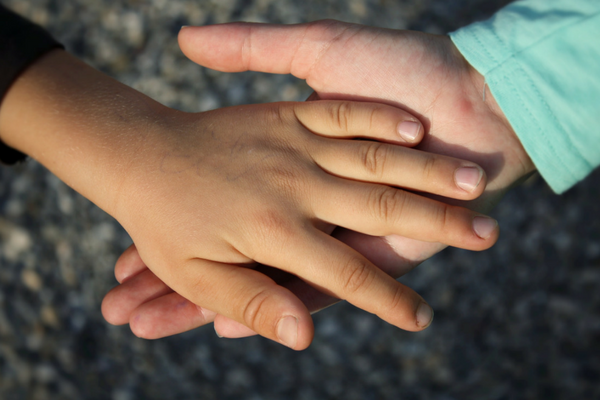Empathy is something that means a great deal to me and its importance keeps making itself known in my world almost every single day.
In my role with Liberty Mutual, as a claims adjuster for Safeco insurance, empathy is highly important if you want to do your job (or at least do it well). Early on, during my first year with the company, I read a book called 8 Characteristics of an Awesome Adjuster. Sounds boring, but it was very helpful for my job path as it really put things into perspective. There was a part that stood out to me where the author compared being an adjuster to being a therapist (which is kind of my dream job), and it’s so true!
 Empathizing with people is something that comes very naturally to me and I’m grateful for that. I’m glad I don’t find myself struggling to feel someone’s pain after their car just got totaled by a 10 point buck or when they were going a little too fast and they hit black ice and spun out. When people call in a claim, it’s probably one of the worst times in their life. Getting into a car accident is scary and extremely inconvenient, especially during times of year when holiday travel is abundant or bad weather is constant, and now they have to turn their lives upside down because their vehicle isn’t able to be driven and they have to find different means of transportation. I feel bad for people who opted out of rental coverage, so they’ll have to pay out of pocket. While they should have been aware of what they elected on their insurance policy, hey, at least there’s a discounted rate we can offer with Enterprise if they’re a Safeco customer, right? True, but that’s the exact type of phrasing I have to try to avoid when I’m talking to customers.
Empathizing with people is something that comes very naturally to me and I’m grateful for that. I’m glad I don’t find myself struggling to feel someone’s pain after their car just got totaled by a 10 point buck or when they were going a little too fast and they hit black ice and spun out. When people call in a claim, it’s probably one of the worst times in their life. Getting into a car accident is scary and extremely inconvenient, especially during times of year when holiday travel is abundant or bad weather is constant, and now they have to turn their lives upside down because their vehicle isn’t able to be driven and they have to find different means of transportation. I feel bad for people who opted out of rental coverage, so they’ll have to pay out of pocket. While they should have been aware of what they elected on their insurance policy, hey, at least there’s a discounted rate we can offer with Enterprise if they’re a Safeco customer, right? True, but that’s the exact type of phrasing I have to try to avoid when I’m talking to customers.
There is a huge difference between empathy and sympathy. Here are the definitions:
Empathy:the psychological identification with or vicarious experiencing of the feelings, thoughts, or attitudes of another.
Sympathy:harmony of or agreement in feeling, as between persons or on the part of one person with respect to another.
You can sympathize with someone respectfully and genuinely feel for what they are going through when something is tough. When someone is sick, you buy them a sympathy card to show them you care, or if a friend of yours is going through a tough divorce, you can be there to listen, try and cheer them up, help them look on the bright side, and give advice. While this is all good and well, how deep are those feelings of compassion you are expressing to them? Does your sympathy for someone else’s pain hit you right in the heart and reflect back to them as such, or is it only skin deep? Do you find yourself consoling them by almost always linking it back to yourself and how you dealt with a similar situation? Are you finding it hard to make the situation completely about them and to totally remove your own thoughts and feelings? I’m sure the answers to those questions are debatable. That’s fine. I’m just here to point out that as you go through life, trying to connect with people on a deeper level—a level that builds trust, connections, and peace—relies heavily on how well you are able to show true empathy.
I see people’s lack of empathy all around me, all the time. I’m guilty of it myself, although it’s been a long time since I haven’t at least tried to think of how another person must be feeling before I judge their actions. It’s hard not to include yourself in the equation, especially if you’ve had a similar experience and you want to share insight into how you handled it. What I have found is if you can just step outside yourself for a few minutes, think about how someone is reacting, try to really feel their struggle and get to the root of their pain, it’s so much easier to react appropriately.
People naturally want to be defensive in situations where they are feeling attacked, for example. There’s nothing wrong with standing your ground, by any means, but I think sometimes people are too quick to stand their ground. They don’t take the time or the effort to really think about what the other person is saying because they’re too wrapped up in being right. Things may feel personal, but a lot of times, they aren’t. If you can detach from a situation and you’re able to conclude that that person would have reacted the same way if you were replaced with someone entirely different, then it’s not about you, it’s them. It’s something that person needs to work through to get to a good place. Even if they are taking it out on you personally, that’s no reason to lash back out at them. That kind of reaction, no matter how right it feels, no matter how much you’re able to justify it, is taking the low road and it’s immature. We are adults and we are capable of empathy. It’s not always easy, but it’s right. Of course, this is all my opinion, but I feel very strongly about this opinion.
I do want to be clear on something. I’m not saying you should let someone crap all over you and not say anything about it at all, ever. However, I feel it’s important to take a step back and say, “Hey, I understand you’re upset. Talking to me that way isn’t going to help anything, but I am here to listen if you really feel like talking about it.” I know, I know. That sounds like a corny Brady Bunch line, but I swear it makes all the difference. I have been praised in my job by the way I’ve reacted to people who were literally cursing at me with every other word over the phone. I have heard other adjusters in the office immediately get defensive with customers who are being verbally offensive and every time I hear it, it blows my mind. They aren’t taking a second to think about how that person must be feeling. Someone just smashed into their car because they weren’t looking and ran a red light, they’re upset and shaken up and pissed off. We are one of the first people they speak to because they need help. Help is what we are there to provide, not an argument. Try and hear the tremble in their voice and feel the shakiness in their hands. Try to envision what they saw at the scene. Try to imagine how that would have made you feel. It’s never right to take anger or hurt out on other people, but we are human and it happens.
This goes for other situations too, of course, not just people lashing out in anger. Sore subjects and sensitive topics such as death, illness, infidelity, divorce, conception, miscarriage, exes, children, debt, etc. Friends, family, acquaintances and complete strangers all have struggles that they are dealing with openly and internally every single day. How they choose to deal with it is one thing and how we choose to react to it is another.
Like I said, I’m guilty of lack of empathy myself. I am just extremely aware of it at this point in my life. I think it’s an important thing to be aware of. I am also admittedly a very sensitive person. I understand that it’s easy to take things personally. Empathy for others creates a foundation of the kind of person you project into the world and sometimes a lack thereof can project insensitivity and rudeness, even if it’s unintentional. So be intentional.
Try it. Think about other people before yourself. Assess situations before speaking, then make an appropriate and mature response. Be there for someone wholly, without making their situation about you. Walk in another person’s shoes and decide on what you think they really need.












